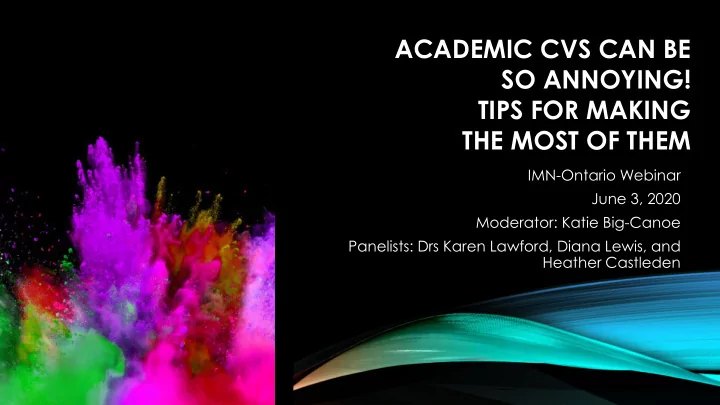

ACADEMIC CVS CAN BE SO ANNOYING! TIPS FOR MAKING THE MOST OF THEM IMN-Ontario Webinar June 3, 2020 Moderator: Katie Big-Canoe Panelists: Drs Karen Lawford, Diana Lewis, and Heather Castleden
THE IMPETUS FOR THIS WEBINAR
WHEN MENTORING GOES BAD…
SUPERVISORS DON’T KNOW EVERYTHING!
ANNOYING? There is the dreaded CCV. You have to keep You have to use The annual report The SSHRC CV. updating it. multiple formats. • The Bio Sketch. CV. • The cumbersome checkmarks! The ‘tailor it to the … Hence, the The short CV. The long CV. job you are ‘annoying’ CV applying for’ CV.
If you don’t have one, create one now. LIMITING THE Every month, take half an hour to reflect on STRESS OF what you’ve done and update accordingly. CV UPKEEP Get into the habit of updating ‘as it happens’: when a when a when a when a when a when a talk paper is grant is grant is degree is committee is is given, accepted, submitted, awarded, completed, joined, etc.
IS A CV ALSO A RESUME? A resume is a brief A CV or Curriculum summary of your Vitae is more skills and experience detailed and it over one or two stretches well pages beyond two pages!
ON THAT NOTE,… A GRANT IS NOT A SCHOLARSHIP AND A SCHOLARSHIP IS NOT A GRANT A grant is operational funds A scholarship is awarded to to run a research project, students/trainees to give usually only PIs/PhDs can them money to (partially) apply. But you (trainees) cover housing, food, tuition often help with grant- so they can focus on writing and you can list studies and not need part- your efforts on your CV. time work.
A CURRICULUM VITAE ( CV ) • A CV is written for academia and should highlight research and teaching experience, publications, grants and fellowships, professional associations and licenses, awards, and any other details in your experience that show you're the best candidate for: • A scholarship or fellowship • A grant • A tenure-track position • A promotion • An award • An academic administrative position • Calling it a ‘brag book’ is probably a good way to describe it.
“A BRAG BOOK” ≠ INDIGENOUS WAYS OF BEING
A CV’S COLONIAL STRUCTURE Most important ‘stuff’ first: Other ‘stuff’ after that: 1. Education 1. Non-refereed reports 2. Awards/Scholarships/Prizes 2. Creative works* 3. Research/Employment Experience 3. Media engagement 4. Grants/Funding 4. Teaching 5. Publications (Peer Review, etc.) 5. Supervision 6. Keynotes 6. Peer review & committee/community work* 7. Invited Talks 7. Professional affiliations 8. Conference presentations 8. No References on a CV
CV TIPS • Best Font Type? • Be Consistent • Calibri • Carefully Edit • Garamond • Lots of White Space • Avenir • Reverse Chronological Order • Didot • Cambria • Number Items in a Section • Best Font Size? • Count everything! • Depends • Include References? NO* • Headings • Bolding your name in publications, • Sub-Headings presentations, grants • Bold/Underline? • Include hyperlinks, especially to • Bold: Depends artistic creations • Underline: Never
MASTER’S STUDENTS • Education: • Teaching Experience • Thesis Topic? • Responsibilities beyond grading • Thesis Supervisor? • Class size • Awards: • Bold name in multi-author conference talks • Include $ amount • Don’t forget to brag (e.g.., being invited to an event) • Advice to ‘build’ your CV: • Scholarships • Conference presentations • Include $ amount • Co-authorship with supervisor • Include funder • Research assistance • Research Experience • Training/professional development • Topic, activity, supervisory? • Contributions to Publications
PHD STUDENTS • If you have a CV already, we suggest you • Advice to ‘build’ your CV while in your make a CV outline and then backfill with program: the information you already have to avoid • First authorship with supervisor duplication or repetitive categories. • Aim to publish 1 peer-reviewed publication • Avoid using acronyms or abbreviations. each year x 4 years • Research experience needs explanation. • It does not have to be on your dissertation research • Teaching experience needs explanation. • Systematic literature review • Service needs explanation. • Book review • Use APA format (or choose one other style • Organize a conference session that you are comfortable with) to reference • Participate in academic governance your citations. Be consistent. • Network, network, network! • Bold your name in listing your publications. • Training/professional development
IDEA FOR FORMATTING SCHOLARSHIPS AND AWARDS
EARLY CAREER RESEARCHERS: SCHOLARLY CONTRIBUTIONS
EARLY CAREER RESEARCHERS: FUNDING RECORD
EARLY CAREER RESEARCHERS: REPORTING ON FUNDING
RANDOM FINAL THOUGHTS Identifying yourself • Your community If you don’t know If they don’t know, • Your tribal affiliation ask someone. ask someone else. • Use academic address over home address Mentorship is so Chances are key to your someone can help academic you ☺ trajectory!
DON’T FORGET TO UPDATE YOUR CV! Professional Development 6. 2020: Academic CVs can be so annoying! Tips for making the most of them. Indigenous Mentorship Network of Ontario Webinar by Drs. Karen Lawford, Diana Lewis, and Heather Castleden. June 3, 2020. 5. 2019: Certificate on Research Ethics. This online tutorial is an introduction to the 2nd edition of the Tri-Council Policy Statement: Ethical Conduct for Research Involving Humans. 4. 2019: Indigenous Mentorship Network of Ontario Summer Institute at Queen’s University involving workshops on: Grant writing, CBPR, Relational and Procedural Ethics, Academic Publishing, Politics of Academic Navigation, Sharing our Research Training Journeys, as well as hearing from various Indigenous organizations. (June 16-20, 2019)
Meegwetch! Wela’lin ! Thank you! karen.lawford@queensu.ca diana.lewis@uwo.ca heather.Castleden@queensu.ca
Recommend
More recommend